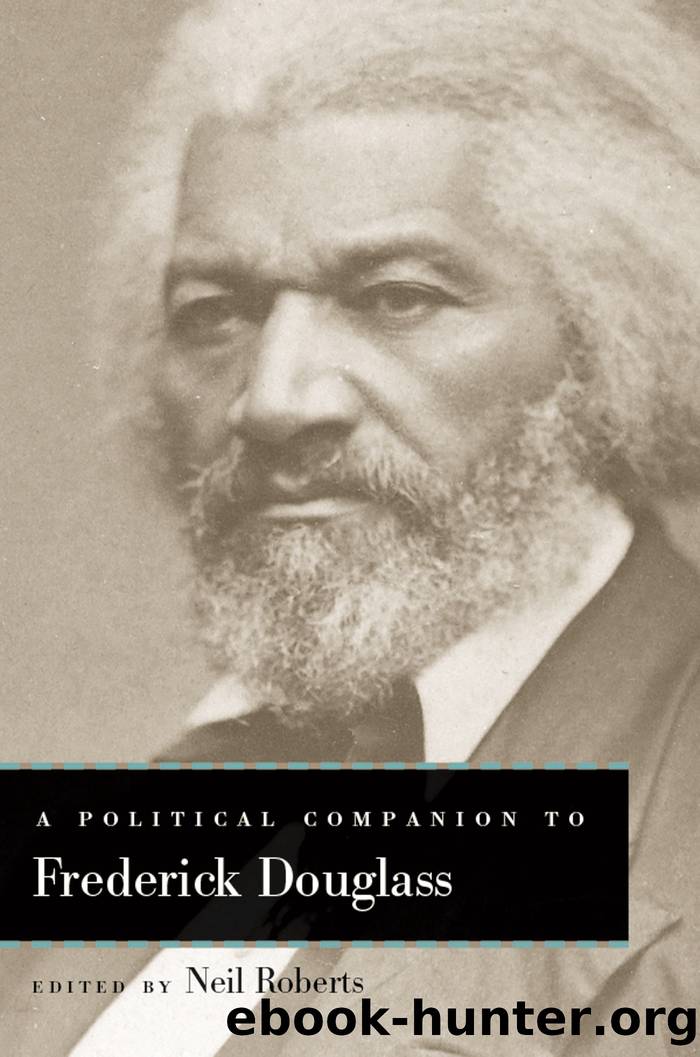A Political Companion to Frederick Douglass by Unknown

Author:Unknown
Language: eng
Format: epub
Publisher: The University Press of Kentucky
Published: 2018-10-15T00:00:00+00:00
8
âThe Human Heart Is a Seat of Constant Warâ
Frederick Douglass on Human Nature
Nicholas Buccola
In The Lincoln Persuasion, J. David Greenstone demonstrates that although the mainstream of American political thought is marked by widespread commitment to âthe basic [liberal] values of private property, individual freedom, and government based on popular consent,â there remains significant dispute within liberalism over âbroader social and philosophicalâ matters, perhaps the most important of which is âthe nature of the human personality.â1 Greenstone argues that in order to make sense of a thinkerâs vision of âa good society,â we must come to terms with what he or she thinks about human nature. In this chapter, I provide a detailed reconstruction of what one of Americaâs greatest liberal thinkers, Frederick Douglass, thought about human nature.2 Such a reconstruction is worthwhile not only because it can serve to deepen our understanding of the foundations of Douglassâs political morality but also because it can serve to counter common criticisms of liberal views of human nature.
Criticisms of liberal theories of human nature tend to fall into three categories. First, there are those who claim that liberals ignore questions about human nature and replace them with a âformalistic preoccupation with rights, interests, and rational preferences.â3 Second, there are those who claim liberals offer a view of human nature that is overly optimistic because they overstate the sovereignty of the rational capacity, the tendency toward goodness, and the possibilities of improving men. Third, there are those who claim liberal views of human nature as far too pessimistic because they tend to overstate the sovereignty of human passions, manâs selfishness, and his disregard for morality. Depending on whom you ask, then, liberalism lacks a theory of human nature or offers a theory of human nature that is overly optimistic or offers a theory of human nature that is overly pessimistic. In the face of these criticisms, we would do well to reconsider the ideas of the great thinkers such as Douglass to see just what liberals have actually said about human nature. I argue that none of these lines of criticism finds an easy target in Douglass, who did not ignore human nature or accept a one-sided view. He instead offered a nuanced theory that appreciates the competing tendencies within human beings. His nuanced theory of human nature was at the foundation of his morally robust formulation of liberal rights and duties.
Like thinkers within other ideological traditions, liberals are divided on questions about human nature. The liberal tradition has within it, to borrow Reinhold Niebuhrâs felicitous language, âchildren of the lightâ and âchildren of the darkness.â4 Some liberals, such as John Stuart Mill and Thomas Jefferson, were on the whole optimistic about human nature.5 They emphasized the rationality, progressivism, and capacity for good in manâs nature. In contrast, liberals such as John Locke and Judith Shklar have highlighted manâs inherent fearfulness and capacity for viciousness.6 As noted earlier, critics are no less divided on the theory of human nature that animates liberalism. Several of liberalismâs detractors, such as Sheldon Wolin, C.
Download
This site does not store any files on its server. We only index and link to content provided by other sites. Please contact the content providers to delete copyright contents if any and email us, we'll remove relevant links or contents immediately.
4 3 2 1: A Novel by Paul Auster(12372)
The handmaid's tale by Margaret Atwood(7757)
Giovanni's Room by James Baldwin(7325)
Asking the Right Questions: A Guide to Critical Thinking by M. Neil Browne & Stuart M. Keeley(5757)
Big Magic: Creative Living Beyond Fear by Elizabeth Gilbert(5754)
Ego Is the Enemy by Ryan Holiday(5413)
The Body: A Guide for Occupants by Bill Bryson(5080)
On Writing A Memoir of the Craft by Stephen King(4935)
Ken Follett - World without end by Ken Follett(4723)
Adulting by Kelly Williams Brown(4565)
Bluets by Maggie Nelson(4547)
Eat That Frog! by Brian Tracy(4525)
Guilty Pleasures by Laurell K Hamilton(4439)
The Poetry of Pablo Neruda by Pablo Neruda(4097)
Alive: The Story of the Andes Survivors by Piers Paul Read(4018)
White Noise - A Novel by Don DeLillo(4002)
Fingerprints of the Gods by Graham Hancock(3995)
The Book of Joy by Dalai Lama(3976)
The Bookshop by Penelope Fitzgerald(3844)
